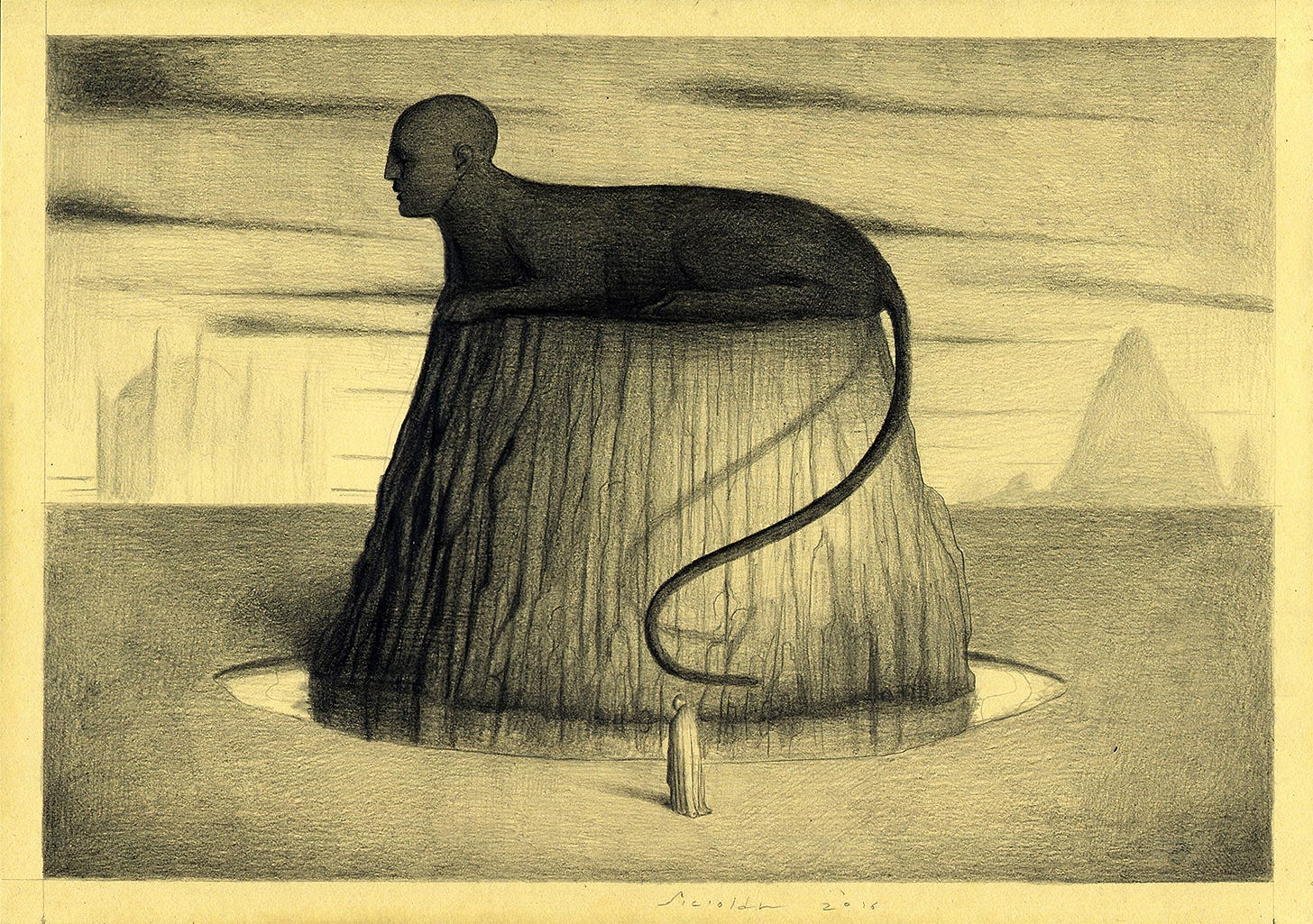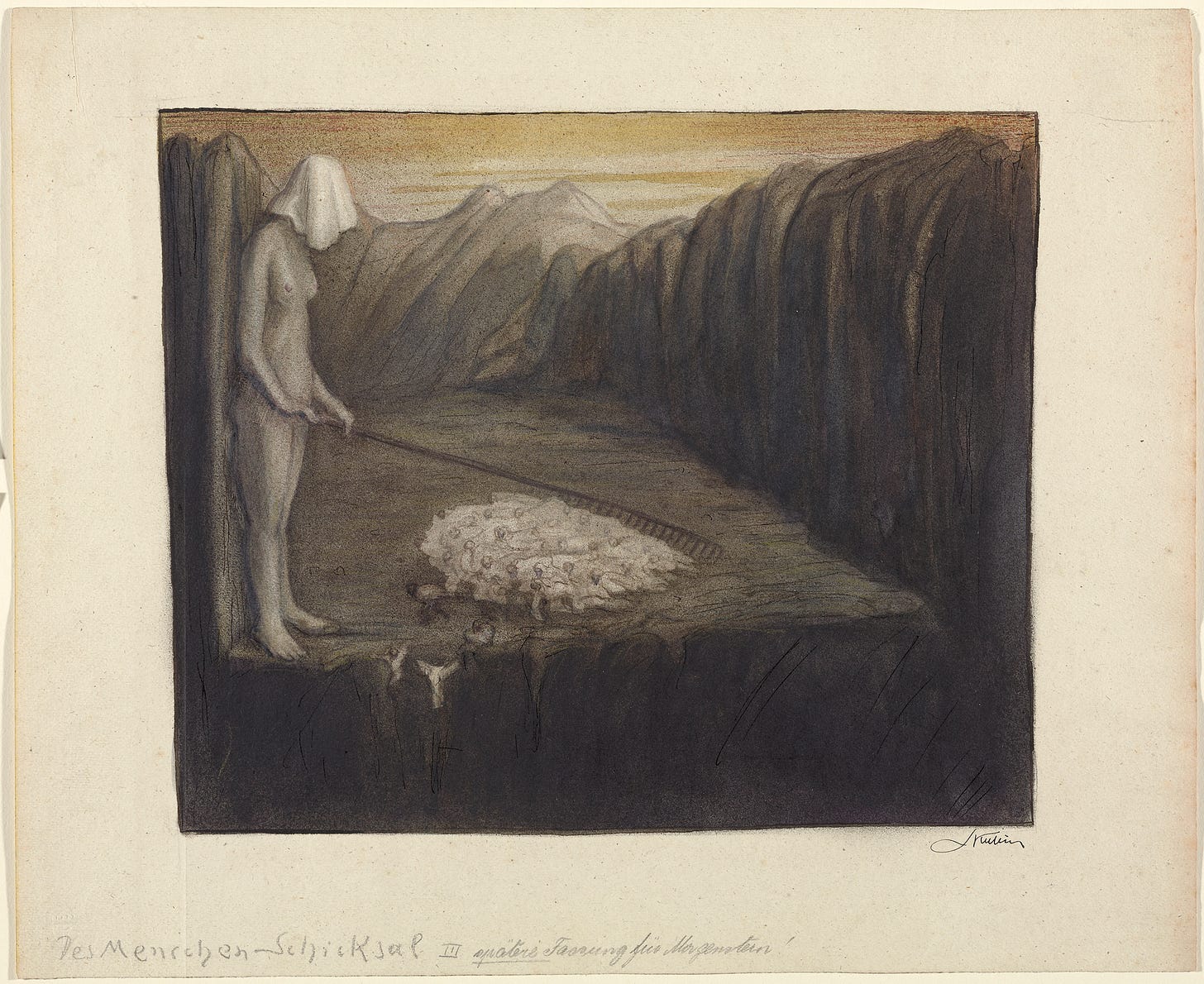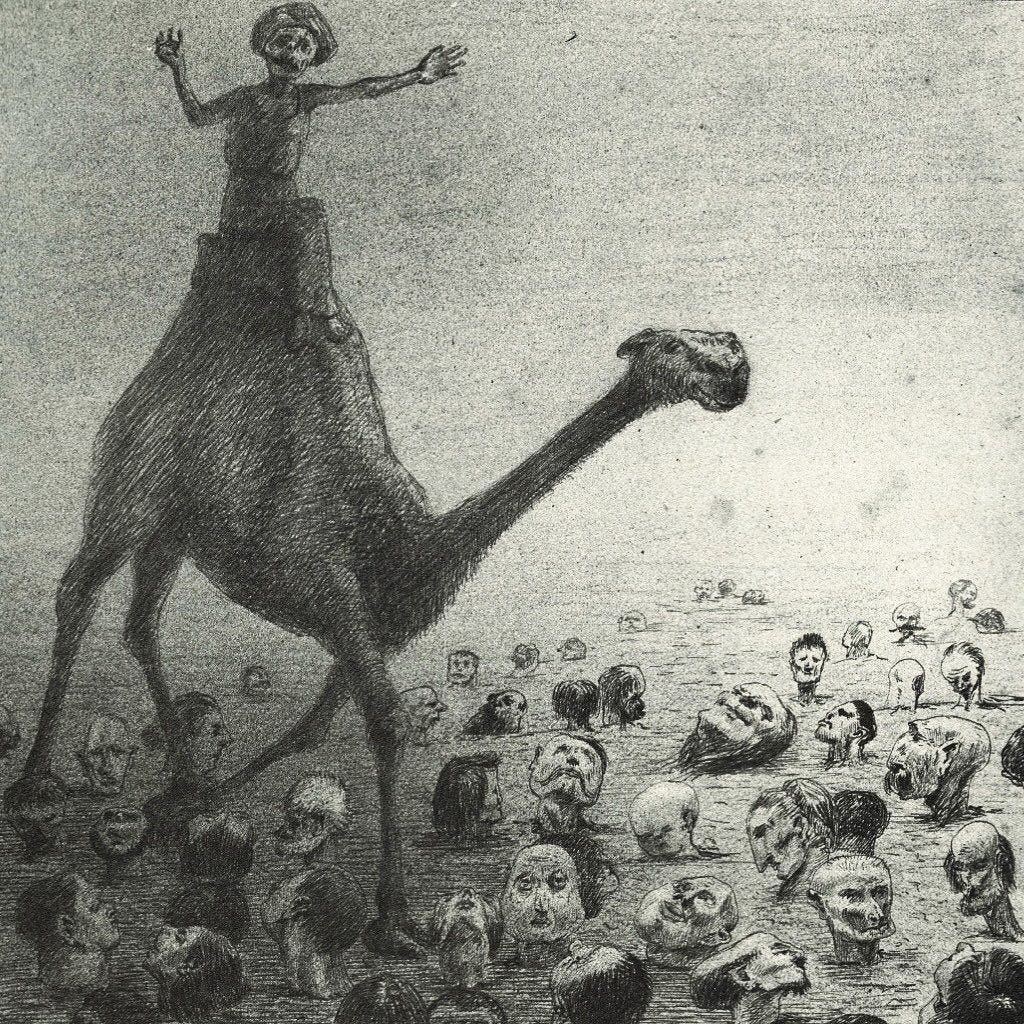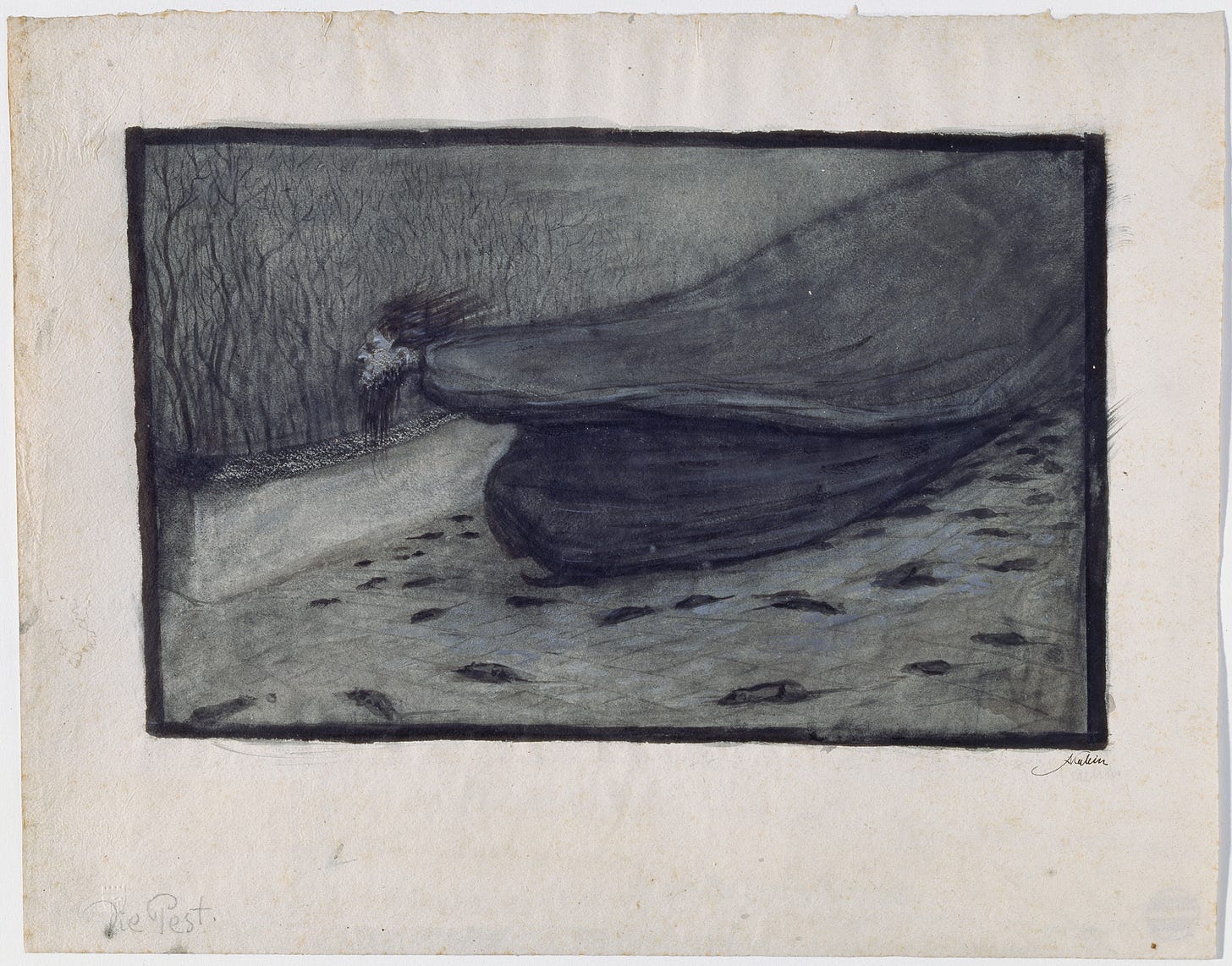The following is a late writing by Ernst Jünger, published in 1993, a prognosis for the coming century. His focus is on the retreat and return of the gods, and overcoming the war of invisible forces. The insights are especially poignant given the theological turn, a clownish second-religiousness, and what may be the apex of nihilism descending towards a final clash.
Translated by Bruno Zimmer and Michael Halfpenny
One who speaks of the gods (now or then), no longer makes himself as irrefutable as at the start of the century, or as with the elites since Voltaire.
Of course, these two hundred years constitute a tiny period, and perhaps only an interruption compared to times in which gods and demons were worshipped. Certainly, even before Lucian, there were always spirits who amused themselves in regards to the gods, or at least in regards to those of others. Although one kept to himself. Still with Augustine, the gods are present, however, he grants them a mere demonic, or titanic, character. His question as to whether they can create or maintain a world empire strikes at the heart of our present situation. When Nietzsche weighs Apollo and Dionysus against each other, this is more than mythological symbolism – what is meant is mythical substance.
*
“God”, even if the name is not called, or the language more or less convincingly coiled around it, still enjoys a certain respect. That the account does not add up with our here and now is instinctively felt and recognised at every spiritual level. Prayer manifests itself accordingly.
Nietzsche’s “God is Dead” can only mean that the epochal state of knowledge does not suffice. Besides that, the author contradicts himself with the “Eternal Return”.
*
The divine lives. When names are mentioned, most people think of pre-Christian or local deities. Their temples are in ruins, and of the many once worshipped there, not even the titles are known anymore. So even gods are mortal – but this says nothing against their essence and reality.
*
Gods too are part of our imagination. We can move closer to them, as in sacrifice and prayer, but not behind the curtain on which they appear – there they remain in the “thing in itself”. For this classification (“Religion within the limits of pure reason”) Kant was reproached as “denigrator of Christendom and perilous religious innovator” (Prussian cabinet order of 1794).
Cults are grounded in the hope of divine encounters; to raise them to certainty remains their task. A cult is all the more moving the more persuasively it celebrates this knowledge in festivals and works of art. In a city approaching the Eternal, art would have to become sacred and the sacred would have to become art. This is unattainable in time – therefore, in iconoclasm there may well be conciliation, but no result. There are no temples in the Eternal City because art has achieved the timeless beauty for which it strives tirelessly, and yet, in vain. We must content ourselves with what is offered to us, like a little old woman who venerates a piece of bone as a relic.
*
After all, we are no strangers to timelessness. We come from it and we go to it: it accompanies us on the journey as the only luggage that cannot be lost. It casts its shadow on us when we suffer, and gives us life when its light touches us.
*
I owe the word “Gestaltwandel”1 to Leopold Ziegler – as well as a conversation about The Worker, shortly after it was published. We were near the refuge above the Goldbach Chapel, where I now turn to these notes with a good view of the lake.
Gestaltwandel of the gods means the changing manifestation of their worship. There are places that have been considered sacred through time, although the religions changed. Perhaps an angel had appeared there once, a miracle had happened. New temples were built from the ruins of the old. They remained as the destination of pilgrimages, festivals, sacrifices, and devotions. Prayers are always significant; but it is said that they are most likely to be answered here.
*
The war of the titans and the twilight of the gods are metahistorical – out of nature and the cosmos they intervene in history. From a chronological point of view, it is to be assumed that the Titans preceded the gods and managed the chaos. This complies with the myth of the gods having been begotten and taught by the Titans. Their uprising shakes Mount Olympus – they are subdued by Zeus and banished to the underworld. But they return – like Prometheus unleashed in the form of the Worker. The gods create out of timelessness; the Titans act and invent inside of time. They are related to technology rather than the arts. Therefore, Hölderlin advises the poet to dream and to take solace in Dionysus while the “iron ones” rule – but he knows that the gods will return.
*
On arithmetic. The exponent is the digit placed over the base that indicates how many times it can be multiplied by itself. In the equation: 2 ^3 = 8, “2” represents the base, “3” represents the exponent, and "8" represents the result. The base is also called “the root”, the exponent “the index”. The equals sign represents “the middle”. The middle mediates; it separates and connects at the same time.
*
On botany. If we transfer the equation into a parable, let the base be understood as the root, the combining character as the trunk, and the exponent as the crown of a tree. The result is the fruit. It is to be considered as pure product first, that is, separate from the economic, aesthetic, and moral valuations which constitute it.
*
On spelling. “To expose” is “to remove” as well as “to read” and “to construe”. I focus on a work, a piece of writing, in detail, consider its character and interpret it.
“To expose oneself” is “to dislodge oneself”, into the unknown, especially to a danger. It is, seen neutrally, a carrying-oneself-out. This gift (the expositional) is purely potential at first, but it creates facts. (Accidentals in the sense of Thomas Aquinas.) Qualities such as good and evil, beautiful and ugly, are attached to them as tags depending on the place and people. After all, removing oneself also affects the perspective, and thus the style – for example, not “I am being executed,” but “I am taking part in my execution.” This already touches transcendence.
The exponential share of deeds and works determines the sensation they cause. The lifespan of a piece of poetry or a work of art is determined solely by its base number, that is, its character.
*
On biography. In life, everyone exposes himself either more or less. One makes the most of his talents, the other wastes or buries them – in between lies the juste-milieu, the moderate housekeeping.
The individual can double his strength, increase it tenfold – this does not change the base. Napoleon estimated his presence on the battlefield as equal to one hundred thousand men. But he failed in character, not in potency. This is eminently true of Hitler as well.
*
On transcendence. There are encounters by hook or by crook, that put life and limb into question – they open up a wide field between political intelligence and ethical discipline.
The final encounter, the one with death, no one can escape. Here everyone exposes himself absolutely. His potency eludes time and number; it becomes imaginary. If we insert the base “X” for the individual as the one unknown to himself, he exposes himself infinitely:
X∞
Only now does the individual also become “indivisible,” as the name implies. That his potency transcends every measure and valuation includes a hope that surpasses even paradise. The art and the cults encircle and decorate the wall of time (Zeitmauer); the sacrament of death is committed by each one alone.
In “The Death of Ivan Ilyich” Tolstoy describes the transition in which existence is no longer robbed, but in which it is relinquished.
Here also, Heidegger: “Renunciation does not take. Renunciation gives. It gives the inexhaustible power of the simple.”
*
Likewise Schopenhauer in his “Doctrine of the Indestructibility of our True Being through Death”: “For us, death is and remains a negative – the cessation of life; however it must also have a positive side, which, however, remains hidden from us because our intellect remains incapable of grasping it. Therefore, we may well realise what we lose in death, but not what we gain by it.”
*
Beyond suspicion, there is no path. The great pioneer laments that the light would fade just as a new dawn is beginning to shine. “If, in the meantime, a philosopher should think that he would find solace of his own in death, that then he would solve a problem which has so long occupied him: he would probably be like someone who, at the moment he is about to find what he is searching for, has his lantern blown out.”
*
Here, however, there remains doubt. When a strong light begins to shine, it does not extinguish a weaker one, but absorbs it into its glow. Nietzsche prophesizes a thunderbolt of time of such density, in which a thousand years pass not only “as one day” but as a fraction of a second. In this way the “eternal” is consumed by the timeless.
For Hölderlin the wall of time is the dungeon wall that will collapse in the “holiest of storms.”
*
A flower won’t fade away in the stream of light, but will shine more strongly: integrated. It is liberated because splendor and beauty are not enough – that is the reason it is mortal. The token coin is exchanged for gold at the customs station – the obolus becomes the door opener.
*
The extraction of man from history will continue on after the turn of the millennium. The great symbols of “crown and sword” continue to lose significance; the sceptre transforms. The historical borders will blur; war will continue being condemned; the evolution of power and threat will become planetary and universal.
*
The next century belongs to the Titans; the gods continue to lose eminence. Since they will return, as they always have, the twenty-first century will be, in cultic terms, an intermediary, that is, an “interim.” “Dieu se retire.”
That Islam seems to make an exception must not deceive; that’s not because it is superior to the time, but because it is - titanically speaking -in keeping with the times.
*
Titans come and go as forces of nature; they are also represented, formatively, by animal and man.
Hölderlin predicts their arrival in “Bread and Wine”. He also limits their rule by declaring them an interim. He says that in meagre times, and so an age far from gods, that it is “better to sleep.” At the same time he does not rule out the possibility that something mighty, albeit violent, happens in the meantime. “Heroes in iron cradles” are growing up, but they only resemble the heavenly ones.
The poet finds the last refuge - sleep, intoxication, and oblivion - with Dionysus. In this regard Hölderlin agrees with Nietzsche.
*
Schopenhauer sees the world as a playing field of the blind will; it is titanic – subject to eternal change, but transient in nature.
Everything that comes into being is worthy of perishing.
Darwin answered the question of why, despite the blindness of will, splendid formations emerge. “Then perhaps also the Taj Mahal, created by a large number of random stone-throwers?” he was asked as a counter-question.
Schopenhauer, who incidentally rejected Darwin’s theory, searches for the true meaning of humanity in contemplation, that is, in non-action. Timeless insight produces cults and ideas, and especially works of art. He believes that ‘refined Buddhism’ may one day form within Europe: ‘Thus the Volkmetaphysik, religion, it must be’.
Ruskin: ‘The ultimate task of art is the representation of divine works.’ Therefore, approaches.
*
While Hölderlin waits with trepidation for the coming of the interim, and Schopenhauer is sceptical and pessimistic about titanism, Nietzsche feels at home in it. In the fateful year 1888 he notes his recognition of the twenty-first century as his spiritual home. This growing importance of the will is accompanied by a volatile development of energy in the technical world.
*
Peculiar to Nietzsche’s affirmation of the will is his relation to time. Whereas Kant considered time to be among the forms of intuition, to Nietzsche it is of unconditional reality. This position reaches its most extreme point in the doctrine of Eternal Return.
This doctrine is usually misunderstood in that it is not a fruit of knowledge, but a confession.
*
Oswald Spengler emphasizes the special value that the Westerner assigns to time. This is followed by specific forms of timekeeping. Since the Gothic period clocks exist as part of the church towers’ equipment, alongside the crosses. They resound, and cast a shadow over the land.
This development began around the First Millennium with the invention of the wheel clock, which replaced the Elementaruhren. Our century can also be characterized as an age of clocks: their precision and runtime approach perfection. Furthermore, their rhythm does not only measure the smallest and largest things, from the atom to the universe, but also determines everyday movement – for example, in the engine.
The quartz clock is the return of the Elementaruhr on a spiritual level. The earth sheds its skin.
*
The sinking of the “Titanic”, its defeat before the iceberg, is a prophetic sign of a kind that otherwise only exists in myth. Among other things, one may conclude from this that progress is indeed an interim – a phenomenon that has a beginning and end. Of course, it has always been known that trees do not grow to the heavens.
Now the question arises what the earth will look like then – or »what it wants«. Apocalyptic visions seem to repeat themselves at the end of every millennium – today, in keeping with the world mood, they are predominantly technical in nature.
On the other hand, astrologers are predicting an immense spiritualisation. This harmonizes with the Christian anticipation of the age of the Holy Spirit, which comes third, after the Father and the Son. And with it the Third Testament, the word of which is left to the poets.
*
If the interim is regarded as an unveiled, and thus formative, rise of the Titans, then with it must be connected, above all, an earth change – as it announces itself already, and not in the least, by catastrophes. Human involvement and culpability are probably overestimated. Ex negativo, this can already be concluded from the fact that man ultimately proves himself to be impotent – if not adding fuel to the fire.
*
For two hundred years we have been in the midst of a world revolution that is transforming nature and society, with technical impulses preceding social ones. Seen from a historical perspective, a situation repeats itself that has occurred many times before, through the invention of weapons and tools, wars, migrations, desertification of land which follows the exploitation of forests and pastures.
But the question is whether the historical perspective is sufficient, or whether we are not standing at the end, and already outside history. Many signs speak to the fact that an earth revolution encloses and determines the world revolution. This too will be a repetition, but in a larger cycle, in which measurement is not taken in historical epochs but in earth ages. This comes close to Hesiod in the mythical sense, and scientifically to Cuvier’s system.
This perspective is becoming increasingly accepted, even popular. However, here it has to be questioned if we are correctly assessing the significance of major changes, such as those in the climate, the atmosphere, and birth rates. A respect for statistics and fear of large numbers is alien to the Titans.
We should expect not only losses but also shocks, such as new substances and forces in the inorganic, and new animal species in the organic world. Explorations of the unseen can outweigh the discovery of continents.
These are developments of natural forces, to which human assistance belongs as well. They are not to be confused with phenomena in the cultic sense. With them the interim ends.
*
Even where the natural forces align with each other, it does not unfold without hierarchy. Herculean, Centaurian, and Promethean figures begin to emerge – their first one being that of the Worker. Technology is his uniform. As a world language, this frees the Triarians from drilling numbers and the alphabet, perhaps from compulsory schooling altogether. One learns through play and vision – existentially.
*
Not to be forgotten are the giants and chimeras; they appear where scientific research, as in nuclear and genetic engineering, reaches its limits and begins to exceed them.
*
While highly dangerous, the growing spiritualization is also capable of defying annihilation – in war for example, the reduction to an exchange of formulas. The defeated side resigns, as in a game of chess. If he overturns the game’s table, he will meet the fate of the giants.
*
Even the world state will not do away with violence, since it belongs to creation. War transforms into police actions of smaller and larger scale. With a monopoly on nuclear weapons insurrections have no potential, yet terror will increase.
*
The progress of technology can also result in magic. The transmission of thought into action is beginning to occur in some areas, especially in transportation. Even a phone call is not as simple as it seems. Light barriers, transplants, chimeras, dead men appearing on-screen, and so on.
*
There are more and more biotopes in which you hardly have to move your hand to act. Such a state has already been written out of history because it is pleasing. Nietzsche foresaw this condition in the “Last Man” and Huxley detailed it. The interim levels out. This is associated with fellahization - an existence without historical conscience and higher aspiration - one lives for the day.
The elites become more rare and more powerful, because they too reach the limit where thought is transformed.
*
Titans live and act in time. Their power is confirmed in the Eternal Return. This eternity is not the end of time and the ages, but their infinite continuation. One cut and their end is reached.
The Titans do not need prayers; they are served through work. They are highly respected, although their name is hidden behind their action. And so it is that today one no longer says Ouranos, but Uranium. Even Pluto, although earth-mighty, does not number among the Olympians.
*
The gods are not eternal but timeless – insofar as the prayers addressed to them do not fulfill earthly hope, they are fulfilled beyond all hope.
The arrival of the gods can be guessed at – yet, neither calculated nor predicted. Nonetheless, they must appear, because without gods there is no culture. Before the great shifts, there are naive and well-founded expectations directed towards the emanations.
A phenomenon may for a thousand years or more continue to warm as a reflective gleam and answer as an echo, but it weakens with time and with it the theology grows weary. Every sermon becomes a more or less well-done eulogy. Therefore it still has its strongest effect at the tombs.
*
In the interim, gods are anachronisms, even in poetry; it is best to neutralize their names. In correspondence with this, the divine, in order to appear in high spiritualization, needs neither the mask of animals nor of humans. Sure enough, new mutations also require a new level of knowledge. There will be no lack of it since the shears cut sharpest as they begin to close.
Metamorphosis or state-change. We retain the German because the English words due not fully capture the meaning, and also because it is a unique concept developed by Leopold Ziegler.









Brilliant thoughts, thank you for making them available in English!
Thank you for making this available.
Junger's prognosis seems... dim.